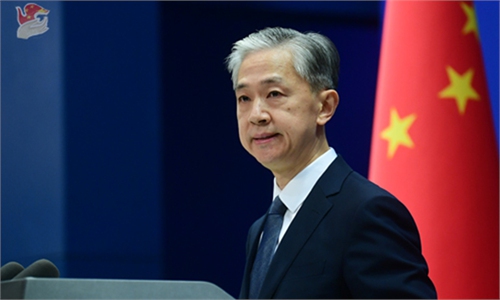Global governance deficits resulting from US hegemony one of causes of Sri Lanka’s crisis

Protesters gather near the presidential palace in Colombo, Sri Lanka on July 9, 2022. Photo: IC
A Washington Post article on Monday discussed how Sri Lanka landed in a political and economic crisis, pointing fingers at China, saying that with foreign-exchange earnings plunging, the country struggles to manage its external debt, which had grown in part due to "loans from China to fund ambitious infrastructure projects."With the domestic crisis worsening in Sri Lanka, there have been voices in the US calling for assistance to Sri Lanka, especially under the Quad framework. On June 10, in a letter to Quad foreign ministers, US Senate Foreign Relations Committee chairman Robert Menendez urged these countries to proactively help Sri Lanka to demonstrate Quad's capabilities in the Indo-Pacific region. A Washington Post editorial last week argued a debt crisis in Sri Lanka "presents an opportunity for the Biden administration to fashion a rescue in conjunction with other members of the Quadrilateral Security Dialogue."
For a long time, the US had a limited interest and role in helping resolve the economic difficulties of developing countries and rarely took initiatives to make such a call. Yang Xiyu, a senior research fellow at the China Institute of International Studies, said that the US' acts this time is not for humanitarian purposes or stabilizing Sri Lanka's economy, but for geostrategic considerations.
Sri Lanka occupies a very critical geographical position in the Asia-Pacific. By offering to provide so-called aid to the economic crisis in Sri Lanka, the US' most important purpose is to strengthen its presence and influence in such important geographical location. The US' consideration goes far beyond an economic scope, rather US aid and economic relief to other countries always has additional conditions based on its own interests, which makes its foreign aid projects lean towards US interests and deviate from that of the recipient countries. Thus, such programs will play an extremely limited role.
US public opinion has long hyped the claim that China's global investment and lending program, including the Hambantota Port Development Project, "amounts to a debt trap for vulnerable countries around the world." Menendez also blamed Sri Lanka's crisis on China's "debt trap."
"In fact, among Sri Lanka's external debts, many different statistics show that China is not the largest creditor. It is not China that is forcing the construction of the Hambantota port, but Sri Lanka has actively invited China to help build it for the sake of its domestic economy," said Zhang Jie, a researcher from the National Institute of International Strategy under the Chinese Academy of Social Sciences. Sri Lanka's economic crisis is caused by a series of domestic and international factors and mistakes in government decisions.
In fact, a series of moves guided by the hegemonic mindset of the US have contributed to the bankruptcy of small countries like Sri Lanka. Xu Liping, a research fellow on Southeast Asian studies at the Chinese Academy of Social Sciences in Beijing, noted that the "deficit" in global governance has led to various crises in Sri Lanka that have overlapped and culminated into political crises.
Marked by the Russia-Ukraine conflict, traditional security threats have returned to the center of international vision, further widening the peace deficit, exacerbating trust deficits between major powers, and fundamentally shaking the foundation of global governance. In addition, non-traditional security matters such as terrorism, climate change, financial crisis, energy crisis, food crisis, and large-scale infectious diseases are increasingly rampant, bringing unprecedented challenges to global governance.
Furthermore, hegemonic inertia has solidified the global governance deficit by distorting the just international political and economic order, causing the absence of many developing countries in global governance, Xu argued. The US, as a hegemonic state, has used its financial hegemony to continuously raise interest rates on the US dollar in its own interest. As a result, dollar-denominated debt, owed by developing countries, increases.
The US-led intra-regional blocs are also a constraint on the effectiveness of global governance. US attempts to assist Sri Lanka through the Quad are likely to fail given a lack of funds, just as are many other US-led regional economic initiatives, which are little more than lip service in practice, but may also have a more negative impact on regional security through its involvement in regional affairs.
According to Yang, the US' recent intentions on the Sri Lanka issue show its tendency to further intervene in regional affairs. It's an attempt to turn the Quad into a mechanism to govern regional affairs.
The author is a reporter with the Global Times. opinion@globaltimes.com.cn


